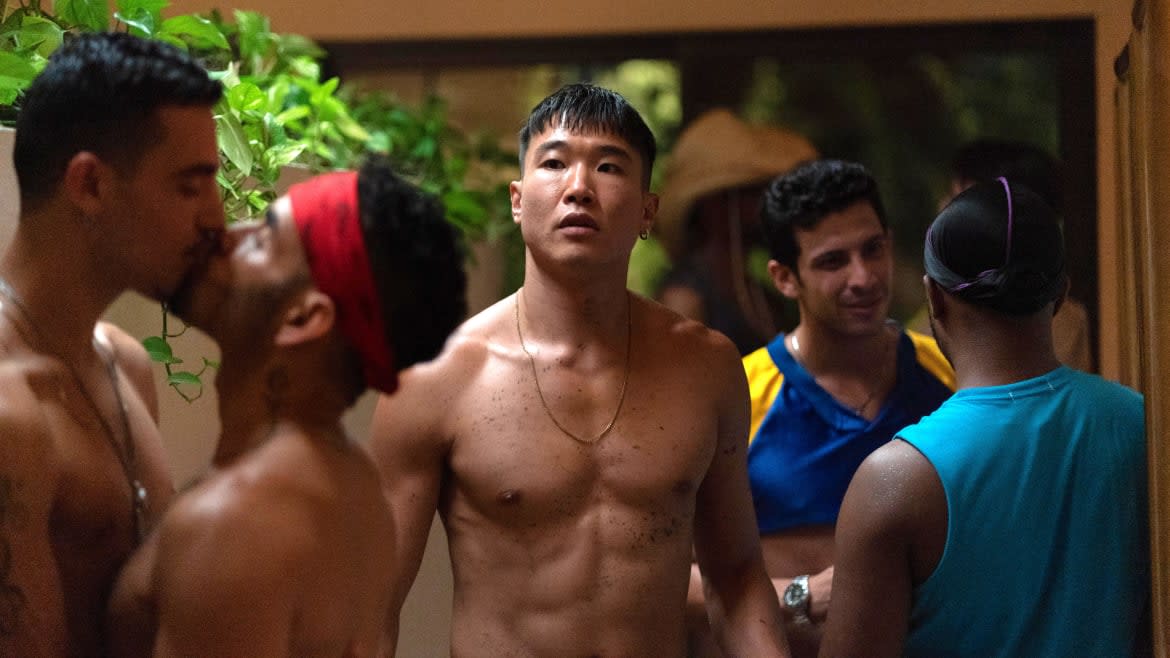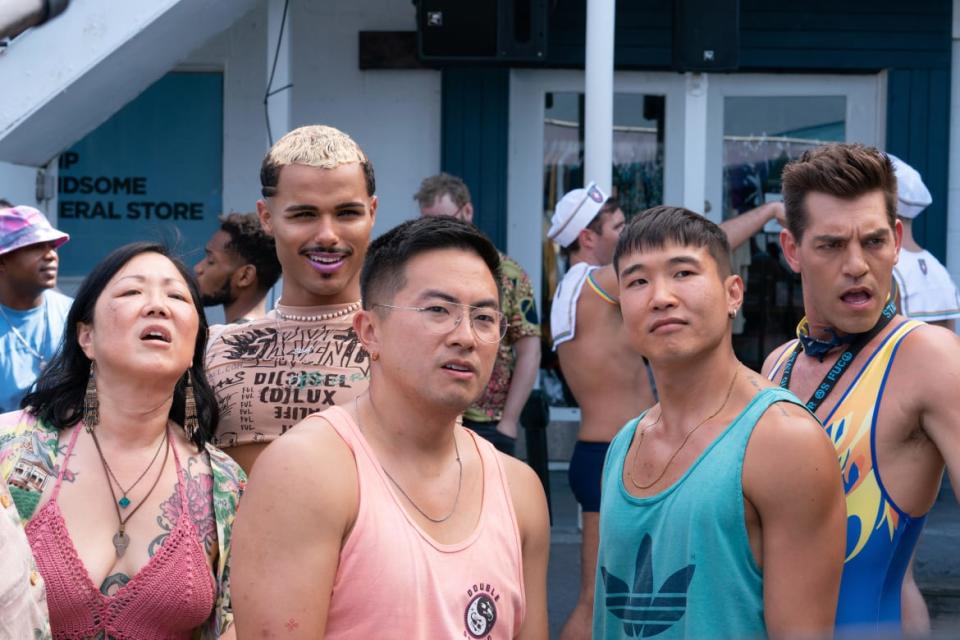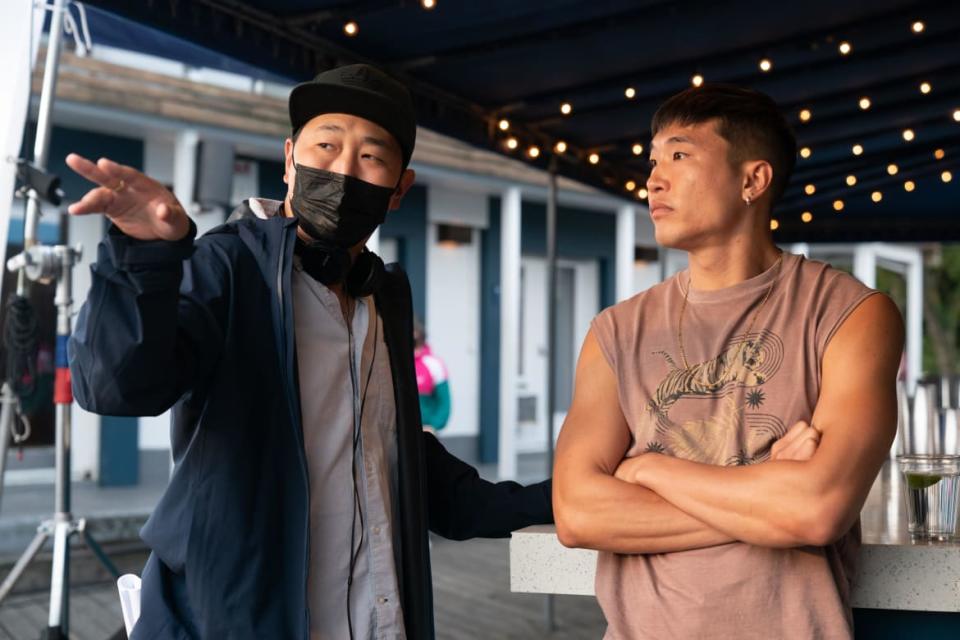Joel Kim Booster Hopes ‘Fire Island’ Starts a Gay-Movie Movement

- Oops!Something went wrong.Please try again later.
- Oops!Something went wrong.Please try again later.
By now, you’ve probably heard that Hulu’s Fire Island, written by Joel Kim Booster and directed by Andrew Ahn, is one of the best movies of 2022 so far. And indeed, the rumors are true.
A modern Pride and Prejudice adaptation with two gay, Asian-American leads, set on the famous LGBTQ vacation spot and starring a cluster of beloved comedians, such as Booster, Saturday Night Live’s Bowen Yang and I Love That For You’s Matt Rogers, seemed like an easy sell when it was first announced—at least for their religious followers on the internet and Las Culturistas stans like myself.
Booster stars as the story’s protagonist Noah, an analogue of Elizabeth Bennet from the Jane Austen novel. When he and his group of friends go on their annual trip to Fire Island, he’s determined to get his timid best friend Howie (Yang), the film’s Jane, laid—a mission that becomes equally as telling about Noah’s vulnerabilities and insecurities as Howie’s. At the same time, Noah is dealing with his own unexpected romantic encounter when he meets his Mr. Darcy, an uptight lawyer named Will (Conrad Ricamora).
The best friends’ parallel experiences on the island paint a rare, fascinating portrait of desirability and respectability politics within the Asian queer community and the queer community as a whole. Of course, there’s plenty of quotable one-liners and a hilarious Marisa Tomei line reading that make Fire Island a capital-C comedy. I’d also be remiss not to mention that it’s a visually stunning film.
If you’ve been following Booster’s career, it’s easy to take the 34-year-old stand-up’s seemingly effortless humor and insight on sex and identity for granted. But sitting down with Fire Island and absorbing his cleverness as a screenwriter and emotional depth as a leading man, you really understand the necessity of his voice and others like it in cinema and other areas of mainstream media.
‘Top Gun: Maverick’ Is Actually the Gayest Movie of the Year
It’s a delight then that, in addition to Fire Island’s release, 2022 will practically be the year of Joel Kim Booster. The comedian, who previously starred on the short-lived NBC sitcom Sunnyside and has written for Billy on the Street and The Other Two, will co-star in the Apple TV+ series Loot starring Maya Rudolph, premiering June 24. He also has a new hour-long stand-up special premiering on Netflix called Joel Kim Booster: Psychosexual on June 21, in addition to his recurring live shows. In the age of streaming, when a lot of art can fall through the cracks, Booster will be pretty hard to miss.
The Daily Beast got to speak with Booster about his screenwriting process for Fire Island, dealing with impostor syndrome, and representing queer sexuality on-screen.
How does it feel seeing all the positive feedback Fire Island has gotten?
I mean, I feel insane—all the time. It’s really intense and overwhelming to see. And I mean, it’s gratifying, obviously, to read so many positive reviews of the movie. But with every review, and the closer we get to the premiere, it starts to feel less like it’s mine, you know? It’s everyone else’s now. And it is crazy to read criticism. Of course, it’s not a perfect movie. But of course, my inclination is to try and make it as perfect as possible. And I can’t. It’s done. And it’s out of my hands. And it belongs to the viewers now. And that’s a really scary thing. This is the first time I’m experiencing it. So it feels like I’m watching my firstborn leave for college.

Fire Island stars Margaret Cho, Tomás Matos, Bowen Yang, Joel Kim Booster and Matt Rogers
I know the idea for the film came to you pretty organically after reading Pride and Prejudice on a Fire Island trip and publishing an essay about it, but how much convincing did you need to actually start working on the script?
So, I had a pilot at Comedy Central that got passed on and I was in a really low place. And it was actually my agent, my writing agent, David Meese, who said, “You should think about turning this essay into a project.” And I was like, “That’s the dumbest idea I’ve ever heard. What are you thinking? I’m going to fire you when I get back.” And then, you know, I was on a long plane ride to Japan and I busted out my laptop and just wrote what was a very, very early version of, like, a half-hour pilot of Fire Island. And I think like, at the time, the impostor syndrome didn’t feel quite as present because it all felt so far away.
You know, it’s funny that I didn’t really start to feel it until after we shot the movie—where I was like, “Who the fuck do you think you are trying to make this movie, this adaptation?” It just felt so abstract—and because it just felt so far away. It was a fun thought exercise more than anything to me? And it wasn’t until people started to take it seriously that I was like, “Oh, my God. Why are people taking this seriously?” So yeah. It was a weird journey, for sure.
How much did you want to challenge yourself as an actor when you were writing the script? Because I feel like comedians who also act are often accused of just playing a version of themselves. Was that something you thought about?
I think my stand-up, especially pre-this upcoming special, I have leaned into sort of like, “Oh, I’m like a stupid, sweet boy, you know?” And that has been my stand-up persona for so long. And I did want to show more of a three-dimensional version of myself. So in a way, it was challenging because I’m so used to playing a heightened version of myself onstage as a stand-up. But in a way, this is a much more grounded, real version of myself. So it wasn’t necessarily a challenge as an actor so much as it was a scary prospect to sort of peel back the curtain on a little bit of who I am as a person more than I do my stand-up.
How did having other comedians cast in the film affect the script? Did you encourage improvisation, or are you the type of screenwriter who doesn’t like to stray from what’s on the page?
No, no. I know that there are screenwriters who are like word-perfect every time, you know? Every “like,” “um,” and comma must be honored. And that is not me at all. I was very open. I mean, you don’t cast people like Matt Rogers in a project and not expect and desire some input, some improv and stuff like that. Some of my favorite lines in the movie were things that just came out of the chemistry of the moment, and so I’m really glad that people felt comfortable on set to do that. And even myself, like there are full monologues in the movie that I have, that I showed up to set, and I was like, I don’t like this as written, I’m just going to wing it. And my poor script supervisor had to have a very arduous task of tracking all of those changes. But between Andrew and myself, I think we really created an atmosphere that encouraged play.
This movie obviously feels special for a lot of reasons. But on a basic level, I found it refreshing to watch a summer movie where people are actually touching and having sex. When you were making Fire Island, were you thinking about how it would differ from a lot of current films in that way?
I certainly wasn’t thinking about the absence of sex in other movies. I think, for me, sex has always fascinated me. And, you know, that’s apparent in my other work and as a stand-up as well. And on a personal level, it’s always like, I think it’s so fast—seeking sex and then who we become when we’re having sex and how that differs from who we are, you know, out living in the world. And so for me, it was just like, it's just a part of me. And so I wasn’t like, oh, I’m writing a sex comedy. But I just was more interested in the ways in which people are desired and desire. We shy away from the the implications of that on a sex-level. And I didn’t want to do that. I just wanted to be honest about it.
On the other hand, there’s probably a crowd of people who would say that the film’s hyper-sexualizing gay men and feeding into stereotypes about promiscuity. And there’s even a brief reference to it early in the film when Max (Torian Miller) sees a group of guys rip their shirts off on a boat.
I definitely was aware that that would be a critique of the film. But for me, like, it always comes back to depth, you know? This movie and our characters are sexual and have sex. And there are characters that are interested in sex and want to have sex. But it’s not the only thing about them.
I happen to check a lot of the boxes of what people might consider a gay stereotype. But there’s also a lot of other stuff that is going on for me. I think there’s a lot of other things and a lot of other facets to these characters, and so the problem doesn’t lie in trying to create a gay character that has no characteristics of what somebody might consider a stereotype—it’s making sure that there’s depth there and that there are levels and that it’s not just the one thing. I think that’s when the stereotypes become problematic—when it stands in for characterization. And my hope is that these characters feel three-dimensional beyond just their desire for sex.

Andrew Ahn directs Joel Kim Booster in Fire Island
On that note, a lot of the conversation around Fire Island has to do with diversity and representation, which is obviously a positive thing. But I’m curious if you ever worry that your identity as a queer, Korean comic overshadows your work or the specificity of your voice.
No, I absolutely do. I’m quite proud that we are checking a lot of boxes in terms of first with this movie, obviously. But that’s not what I went in thinking. That was not at the front of my mind going into writing this project. And it’s frustrating with being the first. Not only is there pressure to be a success—because if not, then there’s this idea with scarcity politics that, “Oh, if this movie does poorly, then we’ll never get another one.” That’s a scary amount of pressure to have.
But then also now that it’s relatively critically successful, a lot of people are using that as a way to discount it because, “Oh, of course it’s being well-reviewed because people are too afraid to give it a negative review because of what it represents.” And that’s deeply frustrating. And it feels like no matter what the work is diminished because if it’s a success, it’s a success because it’s diverse and representative and the first one; and if it’s a failure, then I failed everyone.
I think for any underrepresented group in Hollywood, having that visibility is a double-edged sword.
It’s very hard to feel the win because that part of, of, you know, the representation and the diversity is always a part of the conversation and in both ways that helps and hurts. And it’s one of the reasons I’m so grateful that Billy [Eichner]’s movie is coming out around the same time. And Keiynan Lonsdale’s movie My Fake Boyfriend is also coming out this summer and, you know, shows like Heartstopper and Love, Victor— it feels like the scarcity part is becoming less of an issue for people. And so my hope is that, you know, if people don’t connect with this movie, they are able to just sort of move onto the next one, or be inspired to create their own story. I genuinely hope that there are a million Fire Island clones and that many of them are able to end that. This part of the conversation isn’t going to be the forefront.
Get the Daily Beast's biggest scoops and scandals delivered right to your inbox. Sign up now.
Stay informed and gain unlimited access to the Daily Beast's unmatched reporting. Subscribe now.

